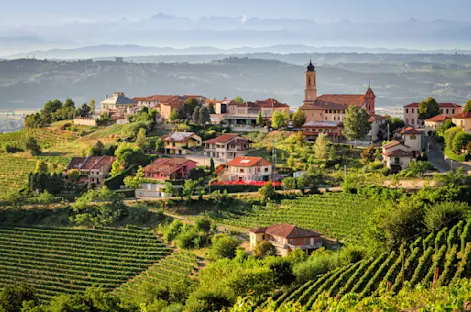Our Carbon Offset Projects
Natural Habitat Adventures pays to offset 100% of the carbon emissions from our trips and office operations—including our guests' flights to and from our destinations. In 2007, we became the world's first tour operator to go carbon-neutral, partnering with the non-profit Sustainable Travel International (STI) to achieve our initial goals. Today, we are working with South Pole to fund carbon reduction projects in several countries, each of which aligns with multiple United Nations Sustainable Development Goals. United Nations SDGs provide a blueprint for peace and prosperity for people and the planet. Here are the carbon offset projects Nat Hab is currently funding:
ETHIOPIA: Efficient Cook Stove Program
Improving health and reducing pressure on forests in rural Ethiopia
SDGs: Good Health and Well-being, Quality Education, Gender Equality, Affordable and Clean Energy, Climate Action, Life on Land
The Ethiopia cook stove project tackles fuel consumption and deforestation by providing innovative home cook stoves to rural communities. The project distributes two types of high-efficiency cook stoves manufactured locally using clay, cement, pumice and metal. In Ethiopia, more than 348,000 acres of forest are cleared each year. Energy-efficient stoves use less firewood than traditional open fires, alleviating pressure on surrounding forests and lowering greenhouse gas emissions. Locals are able to use these contained cook stoves to improve health and safety conditions in their homes by reducing smoke inhalation and lessening the risk of house fires, which are prevalent in rural Africa due to the combination of open fires and thatched roof homes. Additionally, less of the household budget needs to be spent on purchasing wood, so it can be directed to other areas, such as food and schooling.
INDONESIA: Ulubelu Geothermal Power
Harnessing South Sumatra’s geothermal fields for clean energy
SDGs: Affordable and Clean Energy, Decent Work and Economic Growth, Climate Action
The Ulubelu Geothermal Power project offers a sustainable way to power South Sumatra’s homes and industries. As a country dominated by volcanic geology and situated on the Ring of Fire, Indonesia is one of the most seismically active countries in the world. The Ulubelu Geothermal Power Plant harnesses heat from seismic activity at the Ulubelu geothermal field to generate clean electricity for the Sumatra Interconnected Grid. As well as producing renewable energy and reducing greenhouse gas emissions, the Ulubelu Geothermal Power Plant contributes to Indonesia's sustainable development and provides employment opportunities to locals. As an inexhaustible source of energy, geothermal power diversifies Indonesia's sources of electricity generation, improving energy security and driving the country toward a low-carbon future.
INDONESIA: Asahan River Hydroelectric Power
Transforming the power of Indonesia’s flowing rivers into renewable energy
SDGs: Affordable and Clean Energy, Decent Work and Economic Growth, Climate Action
The Asahan River Hydroelectric Power project channels the power of flowing water to produce renewable electricity. Massive rivers cut across Indonesia’s lush landscape, offering power that can be harnessed for hydroelectric generation. Situated on the Asahan, one of North Sumatra’s largest rivers, this run-of-river project eliminates the need to build a dam or reservoir. This preserves Sumatra’s unique and biodiverse ecosystems while powering Indonesia’s economy, reducing GHG emissions and supporting the country’s transition toward renewable energy.
PAST PROJECTS
INDIA: Mytrah Wind Power
Projected annual emission reductions: 479,448 metric tons of CO2
The Mytrah Wind Power project brings renewable energy sources to the southern states of India including Tamil Nadu, Karnataka and Andhra Pradesh. The project benefits local communities by providing 150 jobs and establishling educational opportunities for young women. In addition to these initiatives, the organization also provides clean drinking water to 12,000 people via seven water plants.
ZIMBABWE: Kariba REDD+ Forest Protection
Projected annual emission reductions: 3,000,000 metric tons of CO2
The Kariba REDD+ Forest Protection project in Zimbabwe has conserved 1.9 million acres of land by working to prevent deforestation and land degradation, keeping more than 18 million tons of carbon dioxide from entering the atmosphere. The organization also supports local communities by establishing 19 health clinics and providing 60,250 people with safe drinking water. Its economic and health-related outreach programs impact 85,000 people in the region, 40 percent of whom are women seeking education and training for project management.
RWANDA: Efficient Cook Stove Program
Projected annual emission reductions: 58,315 metric tons of CO2
The Rwanda cook stove project tackles fuel consumption and deforestation by providing innovative home cook stoves to communities throughout Rwanda. With 10,800 cook stoves distributed, locals are able to use these stoves to improve health conditions in their homes by reducing smoke inhalation. In addition, locals use 70 percent less firewood compared with traditional stoves, decreasing rampant deforestation in central Africa. The new stoves also free up approximately 2 million hours of time required to collect wood, allowing people to spend more time on income-generating activities.































